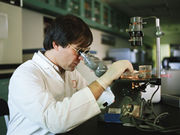FDA OKs Drug for Hemophilia A With Factor VIII Inhibitors
Weekly prophylactic treatment associated with substantial decrease in bleeding episodes
Simple Checklist Can Identify Useful Clinical Practice Guidelines
Eight-item tool developed for clinicians to identify trustworthy, useful, and relevant guidelines
Many Health Care Providers Work While Sick
Pharmacists and physicians have the highest frequency of working with influenza-like illness
Heterogeneity of PET/CT Imaging Phenotype Prognostic in mCRPC
Assessments of androgen receptor, glycolysis prognostic in castration-resistant prostate Cancer
Sentinel Lymph Node Biopsy Underused in High-Risk SCC
<0.1 percent of patients with high-risk SCC tumors underwent SLNB; 14 percent underwent dissections
Drug Combo Doesn’t Lengthen Glioblastoma Survival
Lomustine+bevacizumab may increase progression-free, but not overall, survival versus lomustine alone
Health Care Experts in Favor of Patient Contribution to Notes
With some cautions, experts are supportive of the OurNotes medical notes intervention
Insurance Underlies Black-White Survival Disparity in CRC
54 percent of excess risk of death in black colorectal cancer patients accounted for by insurance matching
ER- Breast CA Risk Up for African-Americans With T2DM
ER- type accounts for increased breast cancer risk in African-American women; highest risk in nonobese
Use of MMR Deficiency Testing in Younger CRC Patients Is Low
Just 43.1 percent underwent mismatch repair deficiency of DNA testing



















